
VATICAN CITY (RNS) — In the days leading up to the conclave, as cardinals have met in the general congregations to discuss the most urgent matters facing the church, the continued need to combat sex abuse, which cardinals described as a “wound” on the church, was emphasized by a number of prelates, according to the Vatican.
As the cardinals consider who should be the next pope, advocates for clergy abuse survivors have also gathered around the Vatican, highlighting the need for a pontiff who will care for victims and who will enforce safeguarding and accountability measures across Catholic institutions.
The meetings have also been an opportunity in the sede vacante, or period between popes, for cardinals and advocates alike to take stock of Pope Francis’ record on sex abuse reforms — as they discuss what they do and don’t want to continue with his successor.
Francis “ was the first pope to really begin to say that clerical sexual abuse is more than a sin, that it’s also a crime. And once he did, that completely changed the whole perception of how the church should react,” said Jo Renee Formicola, professor emerita of political science at Seton Hall University.
The author of “Papal Policies on Clerical Sexual Abuse: God Weeps” said Francis ushered in a new paradigm with the expectation that the church would cooperate with civil authorities, including in the case of U.S. ex-Cardinal Theodore McCarrick, who was defrocked for sexual abuse of seminarians and at least one minor.
But Francis leaves a mixed legacy on sexual abuse, which started even before he became pontiff in 2013. In 2010, while archbishop in Buenos Aires, Francis called for a 2,000-page report on the Rev. Julio Grassi, a respected priest working in the slums in Argentina, who was convicted by a civil court of assaulting a 13-year-old boy in 2009. The report found Grassi innocent, and Francis told Argentine media the allegations were “informative viciousness” and “a condemnation by the media.” Grassi was sentenced to 15 years in jail by a court in Buenos Aires in 2013.
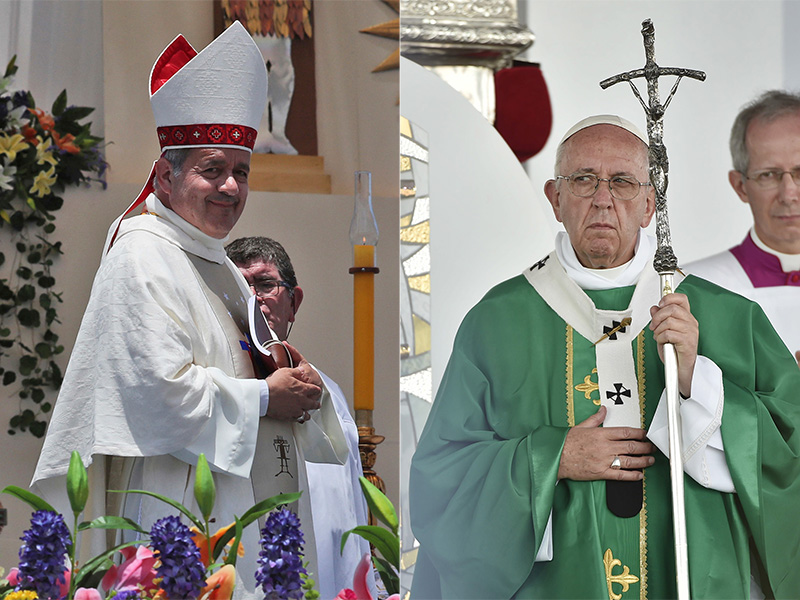
Osorno Bishop Juan Barros, left, in Iquique, Chile, on Jan. 18, 2018. Pope Francis in Lima, Peru, on Jan. 21, 2018. (Left: AP Photo/Alessandra Tarantino; right: L’Osservatore Romano Vatican Media)
As pope, Francis appointed Bishop Juan Barros to lead the diocese in Osorno, Chile, in 2015. Barros was accused of having witnessed abuse by ex-priest and pedophile Fernando Karadima. “There is not one shred of proof against him. It’s all calumny,” Francis told Chilean journalists in 2018.
The proof eventually came, at which point Francis called for an investigation of the church in Chile, and in May 2018, he met with that country’s bishops and 34 of them submitted their resignation.
In February 2019, Francis convened a global meeting of abuse survivors and Vatican experts. While some survivors and advocates praised the pope’s initiative, others said the summit’s proposals lacked real solutions. The following spring, the pope issued an official decree, “Vos Estis Lux Mundi” (You are the light of the world), which included legal procedures to promote safeguarding and enact accountability in the church.
Yet, throughout his papacy, “Vos Estis” remained more an ideal than fully realized. The 2019 defrocking of McCarrick, an influential leader and fundraiser in the U.S. church, was one of the few examples of the papal rules being put in practice.
Even the Pontifical Commission for the Protection of Minors, which Francis established in 2014, has been highly scrutinized for its internal divisions and lack of actions. Members of the commission, including clergy abuse survivor Marie Collins, left the group in 2017, citing a practice of “fine words in public and contrary actions behind closed doors.”
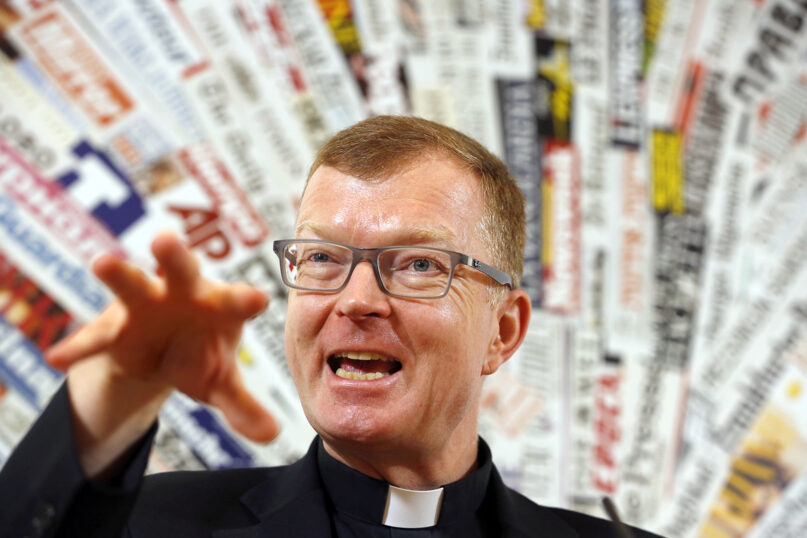
Father Hans Zollner, one of the founding members of the Pontifical Commission for the Protection of Minors, speaks during a press conference at the Foreign Press Association headquarters, in Rome, Sept. 27, 2018. (AP Photo/Domenico Stinellis)
The Rev. Hans Zollner, a Jesuit, served on the commission during Francis’ papacy before resigning in 2023 due to frustrations with its “responsibility, compliance, accountability, and transparency.” Earlier that month, Zollner had admitted to abuse survivors that Francis’ signature anti-abuse laws in “Vos Estis Lux Mundi” were “very often” not working.
But Zollner told RNS after Francis’ death that it was inappropriate to blame Francis for the concerns Zollner had expressed about the commission and “Vos Estis.”
“As long as we overproject on the pope superhuman powers, I think this is not helping to really have a realistic understanding of what is possible,” said the priest, adding that perspective undermines the responsibility of local leaders for the abuse crisis.
Instead, Zollner, who was present for several meetings between Francis and sexual abuse victims, credited Francis for his pastoral care of survivors. “He’s just an empathetic listener with all his heart and all his existence even when people are really angry with him and the church. He’s just been taking it on and taking it in, and he was not defensive at all,” Zollner said.
But some survivors and other advocates have said Francis did not do enough to meet with survivors.
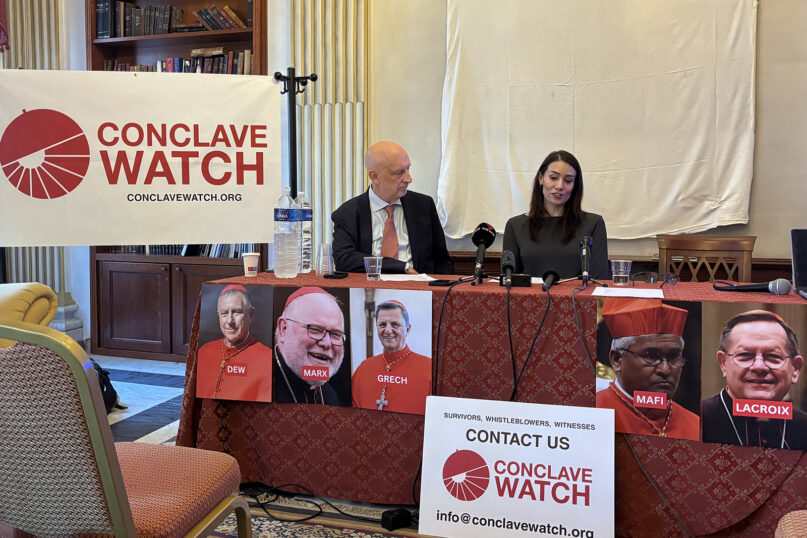
Sarah Pearson, right, and Peter Isely lead a press conference by the Survivors Network of those Abused by Priests, in Rome, April 30, 2025. (RNS photo/Aleja Hertzler-McCain)
Leaders with the Survivors Network of those Abused by Priests faulted Francis for failing to meet with Argentine survivors who had been abused at a school for deaf children, the Instituto Antonio Provolo de Mendoza in Argentina.
“ These are victims where Pope Francis had a particular moral duty and responsibility to them because he was alerted and informed about the abuse at the school,” said Peter Isely, a survivor from Wisconsin and founding member of SNAP, an advocacy group against clergy sex abuse.
Sarah Pearson, a survivor who leads SNAP’s media and communications, said survivors in Argentina were dismayed when Francis was elected because of his mishandling of abuse cases there.
Pearson referenced the story of an Argentine mother who was allegedly denied a meeting with then-Cardinal Jorge Bergoglio when she went to his offices to speak about the abuse of her son by a priest. “ I think about all the survivors from Argentina who really knew about Cardinal Bergoglio, Pope Francis, before the rest of us did,” she said, urging cardinals to examine their peers’ records on abuse.
Francis also did not meet with the victims of one of the biggest abuse cases to rock the Vatican during his papacy — that of fellow Jesuit the Rev. Marko Rupnik, a world-renowned artist whose mosaics adorn over 200 religious sites around the globe, who is accused of sexually abusing several religious sisters in the Loyola Community he founded in Slovenia.
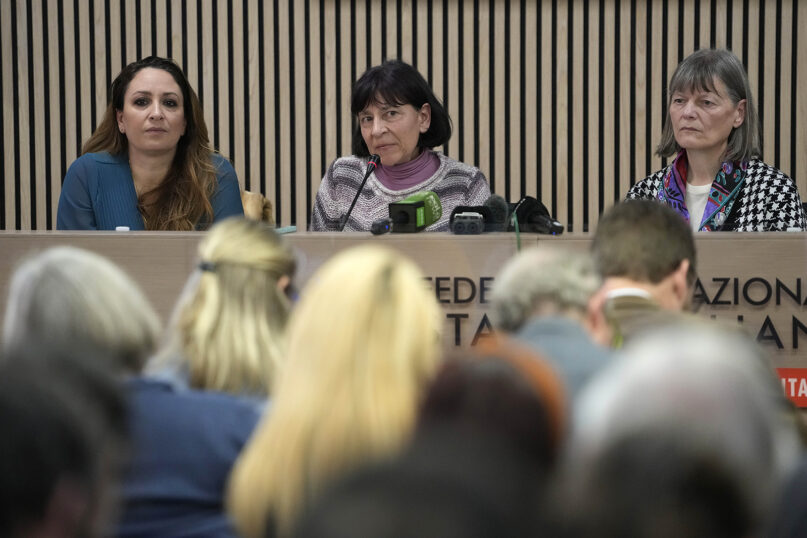
Gloria Branciani, center, is flanked by lawyer Laura Sgrò, left, and Mirjam Kovac, former member of the Loyola community of sisters co-founded by the Rev. Marko Rupnik, during a press conference in Rome, Feb. 21, 2024. Branciani, 59, was one of the first women who accused Rupnik, a once-exalted Jesuit artist, of spiritual, psychological and sexual abuse. She went public to demand transparency from the Vatican and a full accounting of the hierarchs who covered Rupnik for 30 years. (AP Photo/Alessandra Tarantino)
The first reports against Rupnik emerged in 1993 but it wasn’t until 2020 that Rupnik was excommunicated and only for a brief time.
In 2023, Pope Francis lifted the statute of limitations on the Rupnik case, allowing victims to come forward with the allegations, and called for an investigation into the reports.
In January, the head of the Vatican’s Doctrinal Department overseeing cases of sexual abuse, Cardinal Manuel Fernández, told journalists the information-gathering phase was over and they were preparing for the criminal trial by looking for judges.
“We were wondering what had happened (with the trial) before the pope died. We hope we don’t have to wonder when a new pontiff is elected,” said canon lawyer Laura Sgrò, who represents five women claiming physical or psychological abuse while at the Loyola community.
Advocates’ criticism of Francis may bleed into the conclave deliberations or even the next papacy, as they’ve blasted Francis and his curia for refusing to turn over evidence about clerical sexual abuse when it’s been requested by civil authorities.
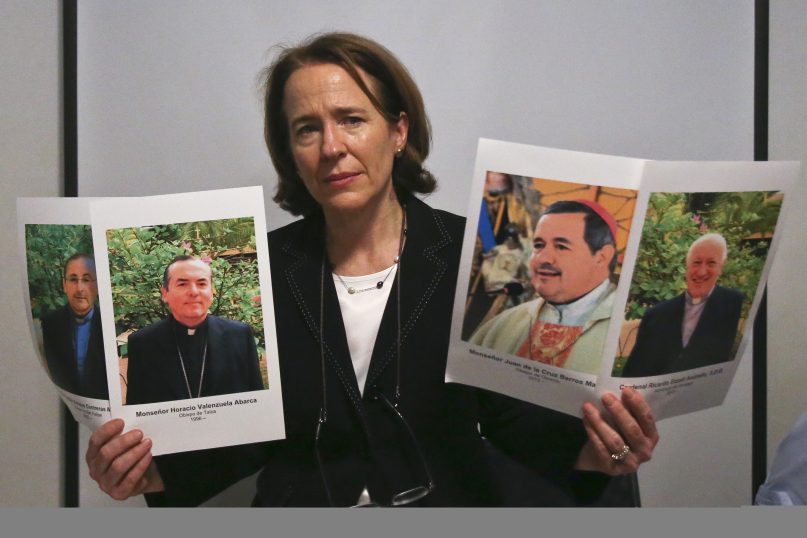
Anne Barrett Doyle, co-director of BishopAccountability.org, a U.S.-based group that has compiled a clergy abuse database, shows images of Catholic clerics implicated in abuse cases against children and teens, during a press conference, in Santiago, Chile, Jan. 10, 2018. (AP Photo/Esteban Felix)
Anne Barrett Doyle, co-director of Bishop Accountability, cited cases where Australia, Chile, the United Kingdom and Poland had reached out to the office of Cardinal Pietro Parolin, now a papal front-runner and Francis’ secretary of state, for records and were denied.
“In December 2019, the pope removed the seal of pontifical secrecy around abuse cases. We naively hoped that the Holy See’s lack of cooperation with other countries would stop, and information would flow,” said Barrett Doyle, at a Friday press conference. “But the new law does not appear to have facilitated the flow of abuse information from the Holy See to civil authorities,” the advocate said, blaming Parolin and warning against his election as pope.
Beyond Parolin, advocacy groups have sounded the alarm about the records of almost all of the papabili, or contenders for the papacy. SNAP has assembled a series of reports on many of those cardinals, called Conclave Watch, urging against their election.
RELATED: Survivor advocacy group sounds alarm about several papabili records
Advocates also have a wishlist for how they would like the next pope to approach sexual abuse. Bishop Accountability released a list of “ten actions for the new pope” on Tuesday (May 6), which include removing at least 10 bishops who “protect abusive priests,” introducing a credible advocate for victims of abuse into the papal commission and enforcing mandatory reporting of abuse to civil authorities.
Zollner said the next pope should focus on “implementation, consistency and sustainability” of norms and safeguarding measures, as well as “transparency, compliance and accountability” when dealing with allegations.
With the new pope, Sgrò “hope(s) for an important legal action for the benefit of nuns, especially when the abuse is perpetrated by those who were supposed to be their spiritual father.”
And Formicola said survivors need to be able to get more than a financial settlement from the church. “ People have to be able to go to the church to be healed,” she said.
RELATED: In the papal conclave, expectations and momentum matter
